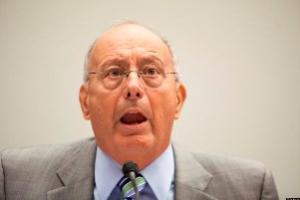Some northwest reformers were disappointed that Washington's marijuana initiative only legalized industry sales, not home growing by individuals -- some even opposed the initiative for that reason. But Washington may soon add home growing to the legalization regime that I-502 got started.
Marijuana legalization is bringing economic and educational benefits to the people of Pueblo County.
Now there is nowhere left in New England where possession of a small amount of weed will get you arrested and thrown in jail.
The hardcore conservative and former Republican senator is going to be a paid marijuana lobbyist.
The 2017 International Drug Policy Reform Conference is the major biannual gathering of drug policy reformers from around the world.
A white-haired conservative Mormon Republican senator from Utah files a medical marijuana research bill, the Arizona Supreme Court tells recalcitrant local officials they can't hide behind federal law to mess with the the state's medical marijuana law, and more.
A Louisiana cop gets nailed for having sex and peddling dope on the job, a sticky-fingered Pennsyvlania cop gets nailed for stealing drug money, a South Carolina cop gets nailed -- nine years after the fact -- for lying on a drug search warrant, and more.
The only legal marijuana state that doesn't allow personal cultivation will revisit the issue, the president chides Colombia and Colombia reacts, there's strong support for pot legalization in New Jersey, and more.
Bostonians celebrate marijuana legalization, California calls for its rescheduling, state attorneys general urge health insurers to reduce opioid prescriptions, Maxine Waters files a bill to end mandatory minimums for drug sentences, and more.
The California safe injection bill came up two votes short of passing this year, Toronto authorities ignore the pleas of pot lounge operators for a place under legalization, Virginia's Democratic attorney general comes out with a plan to fight opioid overdoses, and more.
The Bay State's highest court just made it harder for cops to charge people with pot-impaired driving, Las Vegas-area county commissioners put a stop to talk of pot lounges anytime soon, Colombia's president speaks out against the drug war (again) at the United Nations, and more.
Eight states have legalized marijuana for recreational use, and of those, only Washington does not allow people to grow their own plants. But that could be about to change.

young marijuana plant during vegetative growth phase (Wikipedia)
The state's marijuana regulatory agency, the State Liquor and Cannabis Board (LCB), has announced that it will consider allowing personal home grows. The impetus for the move comes from the state legislature, which passed a bill this year directing the agency to study options for allowing personal cultivation.
Currently, the only people who can grow their own marijuana in Washington are registered medical marijuana patients. But allowing home grows under the recreational marijuana law would potentially vastly increase the number of people able to grow their own supply.
While the state is moving toward allowing home cultivation, it is contemplating a more highly regulated approach than other legal states. In its presss release announcing an October 4 public hearing on the issue, the LCB laid out three options for moving forward:
Option 1: Tightly Regulated Recreational Marijuana Home Grows
Would allow up to four plants per household, but would require home growers to obtain a state permit and enter their plants with the state traceability system.
Option 2: Local Control of Recreational Marijuana Home Grows
Would allow up to four plants per household, but would require a local permit. Plants would not have to be entered in the state traceability system. Local authorities could limit home cultivation to fewer than four plants if they wished.
Option 3. Recreational Home Grows are Prohibited
That would be the status quo. Recreational marijuana consumers would be forced to rely on the state-regulated market to obtain their pot. Or the black market.
There is a fourth option, which the LCB didn't offer up, but which is the case in the other legal pot states: Allowing people to grow their own small number of pot plants without the necessity of obtaining a permit from either the state or local authorities. After all, we're talking about growing a plant in your house or yard here. When it comes to growing your own, the attitude of many Washington marijuana consumers is likely to be: "Permits? We don't need no stinking permits."
back to top
This article was produced in collaboration with AlterNet and first appeared here.
More than 200 graduating high school students in Colorado's Pueblo County will head off to college in a few weeks thanks to legal marijuana. The 210 students will receive scholarships worth $2,000 each for a total of $420,000 -- a very appropriate aggregate figure, given that the scholarships are being funded by excise taxes on state-legal marijuana grown in the county.

CSU Pueblo will see the nation's first pot tax college scholarships. (CSU Pueblo)
>Happy local officials
described the pot-fueled Pueblo County Scholarship Fund as "the country's first cannabis-funded college scholarship." It was created after voters in the sun-filled county, which is building a reputation as a
center of the outdoor and greenhouse-grown pot trade,approved an excise tax on commercial cannabis cultivation in 2015.
Colorado pot taxes have already provided funding for the state's public school system and homeless population, and the Pueblo County scholarships are demonstrating once again the economic and fiscal benefits accruing to states that have legalized marijuana.
And for Pueblo County high school students, there's more to come. The pot cultivation excise tax was 2% last year, but will increase by 1% annually until it tops out at 5%. With rising commercial cultivation and a rising tax rate, the scholarship fund appears set to expand, allowing even more students in the county, where nearly 20% live below the poverty line and where more than 40% of residents are Hispanic, to take advantage of educational opportunities.
But they'll have to stay near home. The scholarships only pay for tuition and fees at Pueblo Community College or Colorado State University-Pueblo. That latter school is also benefiting from marijuana in other ways: Thanks to $900,000 from the state's marijuana tax fund and $270,000 in county pot excise taxes to be used for "community enhancement," CSU-Pueblo last year opened the Institute of Cannabis Research to study topics such as the impact of legalization on local economies, industrial hemp cultivation, and the efficacy of cannabidiol.
Pueblo County Commissioner Sal Pace gave the credit to weed. He told the Cannabist in June the county's abundant sunshine was its greatest natural resource, and taxes on sun-grown weed made both the institute and the scholarships possible.
"There are vast opportunities in cannabis -- from growing to research -- and we want to make sure all Coloradans benefit, not just a select few," he said. "For years, our community has discussed creating local scholarships that could provide opportunity and help break cycles of poverty. The Pueblo County Scholarship Fund will change lives, families and benefit generations to come."
Smoking weed may not help your academic career, but the taxes on growing it are helping some Colorado kids have an academic career. That's one economic impact of legalization you don't need an institute to figure out for you.
back to top
As of noon last Saturday, the possession of small amounts of marijuana is decriminalized in New Hampshire. Now, nowhere is New England will someone caught with a joint or two be subject to arrest.

All of New England is now a minor pot bust-free zone. (Wikimedia)
Two New England states -- Maine and Massachusetts -- have legalized marijuana, and all the others have now decriminalized it.
Decriminalization came when, after years of effort, the legislature passed House Bill 640 in June, and Republican Gov. Jon Sununu signed it into law the following month.
Under the state's old law, people caught with small amounts of pot faced up to a year in prison and a $2,000 fine. Under the new law, the penalty for possession of up to three-quarters of an ounce is reduced to a $100 fine for a first or second offense and a $300 fine for a third offense within three years. A fourth offense within three years could be charged as a Class B misdemeanor, but there would be no arrest or jail time.
The Marijuana Policy Project (MPP), which has been deeply involved in the state for years, congratulated state political leaders for going this far, but urged them to go further.
"The governor and Legislature both deserve a lot of credit for moving the state forward with this commonsense reform," said Matt Simon, MPP's Manchester-based New England political director. "Unlike his predecessors, who opposed similar proposals, Gov. Sununu appears to understand that "Live Free or Die' is more than just a motto on a license plate.
"A lot of credit also goes to the House, which has been supporting decriminalization bills since 2008," Simon said. "It was refreshing to see the Senate finally come to an agreement with the House on this issue in 2017. This is a big step toward a more sensible marijuana policy for New Hampshire."
The next step would be outright legalization, Simon said, pointing to an August Granite State poll that showed more than two-thirds (68%) of state residents supported freeing the weed.
"There is no good reason to continue arresting and prosecuting people for marijuana possession. Marijuana is objectively less harmful than alcohol, and Granite Staters are ready to see it treated that way. A very strong majority of state residents support ending marijuana prohibition altogether," Simon said.
"New Hampshire lawmakers should continue to follow their constituents' lead on this issue," Simon said. "Every state in New England is either implementing or strongly considering legislation to regulate marijuana for adult use. It is time for the legislature to develop a realistic marijuana prohibition exit strategy for New Hampshire."
back to top
Former Republican US senator from New York Alphonse D'Amato will be a lobbyist for the Marijuana Policy Project, the New York Daily News reported last week.

Former senator, now pot lobbyist, Alphonse D'Amato (Facebook)
The marijuana law reform group, which has played a leading role in medical marijuana and legalization campaigns across the country, is starting a state affiliate in New York and has hired Amato as a "senior advisor."
New York has not legalized marijuana, but it does have an existing medical marijuana program, and the MPP New York affiliate will initially focus on ways to promote and strengthen it. Still, D'Amato didn't rule out a change of focus to legalization in the future.
"If we want to be realistic, you've got to look at the nation, what is taking place around us," he told the Daily News. "It's been implemented in seven [sic] states." Actually, eight states have legalized marijuana so far.
"The conversation and the discussion about adult use and the legalization of adult use is taking place and will be taking place," he said. "There is no doubt that that is something that will come more and more to the forefront as time goes on."
And while New York isn't there yet: "It's not something we're promoting but it's something that's taking place around the country and we can't be naïve to it," he said.
Amato's embrace of marijuana reform is an amazing turnaround for a man who made a political career as an ardent -- some might even say rabid -- conservative during his rise to power in state politics and his tenure as a US senator from 1981 to 1999. As a US senator, he was a strong advocate of "law and order," campaigning on issues such as support for capital punishment and harsher drug policies.
That's when he wasn't busy pursuing Bill and Hillary Clinton in the first of the nebulous "scandals" that have plagued the couple to this day. He was a leading critic of the Clinton's over the Whitewater scandal, and chaired the Senate Special Whitewater Committee.
D'Amato credits Howard Stern for showing him the light on weed. A 2009 discussion with the radio personality opened his mind to the notion, he said.
"I think I'm a conservative, but I don't think I'm a right-wing kook," D'Amato proclaimed.
Real conservatives are for states' rights, he said, throwing a jab at his former Senate colleague, Attorney General Jeff Sessions, who wants to see a federal crackdown on states that have legalized medical or recreational marijuana.
"It's a ridiculous position," he said. "I say how can you on the one hand be for states' rights and on the other hand say the states that have legalized the use of marijuana, that you're not going to recognize that. You can't be a states' rights person only when you like what the states are doing and not what the feds are doing. It's one or the other."
Who would have thought? Senator Pothole has become Senator Pot.
back to top

reform-conference-michelle-alexander-keynote_0.png
The 2017 International Drug Policy Reform Conference will convene in Atlanta, Georgia on October 11-14. More than 1,500 people who believe the war on drugs has failed will be in attendance to network, to strategize and to lift up policies grounded in science, compassion, health and human rights.
Attendees will join a broad range of drug policy stakeholders -- activists, academics, healthcare and public health advocates, veterans, formerly incarcerated people, elected officials, students, and many others from around the country and across the globe!
This year, attendees will have the opportunity to spend three days deepening connections with people committed to finding alternatives to the war on drugs while participating in sessions facilitated by leading experts.
Visit
http://www.reformconference.org to register. Get updates on the Reform Conference on
Facebook and
Twitter, and follow hashtag
#NoMoreDrugWar.
A reduced rate is temporarily available for Atlanta-area residents -- email asha bandele for information.
back to top
A white-haired conservative Mormon Republican senator from Utah files a medical marijuana research bill, the Arizona Supreme Court tells recalcitrant local officials they can't hide behind federal law to mess with the state's medical marijuana law, and more.
National
Last Wednesday, Orrin Hatch filed a medical marijuana research bill, complete with a pun-filled news release. Senator Orrin Hatch (R-UT) introduced the Marijuana Effective Drug Study Act of 2017, or MEDS Act, to improve the process for conducting scientific research on marijuana as a safe and effective medical treatment. In introducing this legislation, Senator Hatch was joined by Senator Schatz (D-HI) and cosponsors Senator Chris Coons (D-DE), Senator Cory Gardner (R-CO), and Senator Thom Tillis (R-NC). "It's high time to address research into medical marijuana," Hatch said. "Our country has experimented with a variety of state solutions without properly delving into the weeds on the effectiveness, safety, dosing, administration, and quality of medical marijuana. All the while, the federal government strains to enforce regulations that sometimes do more harm than good. To be blunt, we need to remove the administrative barriers preventing legitimate research into medical marijuana, which is why I've decided to roll out the MEDS Act. I urge my colleagues to join Senator Schatz and me in our joint effort to help thousands of Americans suffering from a wide-range of diseases and disorders. In a Washington at war with itself, I have high hopes that this bipartisan initiative can be a kumbaya moment for both parties." [Bolding done by Chronicle AM.]
Arizona
Last Tuesday, the state Supreme Court refused to let state officials use federal law to get around state medical marijuana laws. The high court on declined to review a Court of Appeals ruling that federal law does not trump the state's voter-approved medical marijuana law. The lower court had ruled that even though marijuana remains illegal federally, federal law does not preempt the state from allowing patients to use it. The case had been filed by recalcitrant Maricopa County Bill Montgomery (R), who didn't want to heed the will of the voters.
Arkansas
On Monday,a filing deadline saw a rush of applicants for grower and distributor licenses. A deadline for grower and distributor applications saw applicants flood the state office building where the paperwork is delivered. Firm numbers weren't available, but applicants overwhelmed the clerks on duty and faced hours-long waits to get processed.
Michigan
On Tuesday, a pair of Detroit municipal initiatives qualified for the November ballot. Two local ballot measures that would open up business opportunities for medical marijuana in the city will go before voters in November. One measure would formally have the city join the state medical marijuana regulatory system and the other would amend the city's cannabis business zoning laws. The two measures overcame a challenge from the Detroit Elections Commission and have now been approved by the county election commission.
Utah
On Wednesday, Ua poll showed high levels of support for a medical marijuana initiative. A proposed medical marijuana initiative from the Utah Patients Coalition has supermajority levels of support, according to a new UtahPolicy.com poll. The poll has support for the initiative at 74%, with only 22% opposed. More strikingly, it also has support among Mormon Church members at 63%, even the Mormon leadership has announced its opposition. The initiative push comes after the legislature has repeatedly refused to pass a medical marijuana bill.
[For extensive information about the medical marijuana debate, presented in a neutral format, visit <MedicalMarijuana.ProCon.org.]
back to top
A Louisiana cop gets nailed for having sex and peddling dope on the job, a sticky-fingered Pennsyvlania cop gets nailed for stealing drug money, a South Carolina cop gets nailed -- nine years after the fact -- for lying on a drug search warrant, and more. Let's get to it:
In Conway, South Carolina,
a Horry County police officer was fired last Friday after he was found to have "misrepresented the truth" in a search warrant application
nine years ago. Kent Donald went down after a Horry County man sentenced to 25 years in prison for cocaine trafficking got his conviction reversed after convincing an appeals court that the search warrant used against him was "maliciously and intentionally issued upon false information and for the purpose of securing a criminal investigation." The man, who spent five years in prison, is now pursuing a civil lawsuit against Donald and the Horry County Police Department.
In Muncie, Indiana, a Delaware County sheriff's deputy was arrested last Wednesday on charges related to his tight relationship with a drug-dealing informant. Deputy Jerry Parks was caught on surveillance tapes while present during a marijuana deal and on recordings providing the description of an undercover officer to the informant. When the informant was arrested on drug charges in Indianapolis, he told investigators Parks gave him information on undercover officers, held his drugs for safekeeping, gave him a department issued gun to use while transporting drug money, and gave him drugs he had seized on duty. It's not clear what the exact charges are.
In Alexandria, Louisiana, an Alexandria police officer was arrested last Thursday for allegedly selling drugs and having sex while on duty. Officer Kenneth Seth Thomas went down after somebody snitched him out to state law enforcement, and an investigation found that Thomas "had engaged in illegal activities by having sex with at least one woman while on duty and distributing illegal drugs." He is charged with malfeasance in office, distribution of a controlled dangerous substance I and possession of a firearm in the presence of drugs.
In Harrisburg, Pennsylvania, a former Fairview Township police officer was convicted last Friday of stealing money seized as evidence in drug arrests. Tyson Baker, 43, a 17-year veteran of the force, was suspected of making off with between $2,000 of $15,0000 seized from a marijuana dealer. He went down in a sting where an undercover agent was pulled over by township police. A video camera recorded him searching the car without a warrant and stealing $3,000 from a cash stash hidden in a gym bag. He was found guilty in federal court of two counts of theft of seized drug money, one count of falsifying records to impede a drug investigation, one count of theft of federal property, and one count of making false reports to the FBI. He will be sentenced at a later date.
In Augusta, Georgia, a former youth detention center guard pleaded guilty last Friday to bringing marijuana into the facility. Devin Lott, 24, admitted the offense and pleaded guilty to possession of marijuana with intent to distribute and violation of oath by a public officer. He was sentenced to 10 years' probation instead of jail time after the judge took mercy on him. His mother and nephew had been killed in a recent car crash and his sister, who was driving, was severely injured and needs assistance with daily activities.
In Hagatna, Guam, a former Guam police officer was sentenced last Thursday to six months in jail after a police search found drugs and paraphernalia at his home. Manuel Joaquin Perez. Perez claimed he'd found and discarded syringes and a baggie with meth residue, but his wife admitted using the stuff. He pleaded guilty to hindering apprehension and official misconduct, both misdemeanors, but had a felony drug possession charge dismissed.
back to top
The only legal marijuana state that doesn't allow personal cultivation will revisit the issue, the president chides Colombia and Colombia reacts, there's strong support for legalization in New Jersey, and more.

Colombian cocaine exports are on the increase. (Spanish police)
California Governor Vetoes Marijuana Packaging Bill. Gov. Jerry Brown (D) has vetoed Senate Bill 663, which would have specified conditions under which cannabis packaging would be deemed attractive to children and therefore banned. Although the bill was approved unanimously by the Assembly and Senate. Brown does not want new marijuana regulations except those developed through his office and regulatory agencies.
New Jersey Poll Has Strong Support for Legalization. A new Quinnipiac poll has support for legalization at 59% among state voters. But the poll questions didn't ask about regulated and taxed sales; it only asked whether respondents supported "allowing adults to legally possess small amounts of marijuana for recreational use." The state is expected to see a strong push for legalization in the legislature next year.
Washington to Consider Whether to Allow Personal Pot Grows. The state Liquor and Cannabis Control Board announced Thursday that it will hold a hearing on October 4 to seek public input on whether to allow residents to grow pot plants for their own use. Washington is the only legal pot state that bars personal grows, but the state legislature approved a bill telling the agency to look into options for allowing personal grows.
Medical Marijuana
Delaware Governor Signs PTSD Bill. Gov. John Carney (D) has signed into law a bill that allows people with PTSD to more easily qualify for medical marijuana. The new law allows PTSD patients to get a recommendation from any licensed physician; the old law required they receive recommendations only from licensed psychiatrists.
International
Trump Threatens to Decertify Colombia as Drug War Partner. In comments Wednesday as the State Department rolled out its annual list of reliable drug war partners, President Trump delivered not so veiled threats to Colombia over increased coca cultivation. Trump said he "seriously considered" decertifying the country because of the "extraordinary" growth in coca cultivation and cocaine production last year. He said he decided against decertification this year because the Colombian military is close partners with the US, but that he would keep it as an "option" and that he expected "significant progress" from Colombia in reducing output.
Colombia Rejects Trump Criticism. The government of President Juan Manuel Santos took issue with Trump's comments: "Colombia is without a doubt the country which most has fought drugs, and which has had the most success on that front," the government said in an early morning statement. "No one has to threaten us to confront this challenge."
Ontarians Are Liking the Notion of Government-Run Pot Shops. A Campaign Research poll released Thursday found that the province's plan to restrict marijuana sales to a government monopoly has fairly strong public support. Some 51% backed the idea, with 35% opposed and 14% with no opinion.
back to top
Bostonians celebrate marijuana legalization, California calls for its rescheduling, state attorneys general urge health insurers to reduce opioid prescriptions, Maxine Waters files a bill to end mandatory minimums for drug sentences, and more.

California_marijuana_template_15.jpg
California Officially Calls for Marijuana Rescheduling. The Assembly last Thursday passed a resolution calling on the federal government to reschedule marijuana. The Senate had approved the resolution earlier. "The Legislature urges the Congress of the United States to pass a law to reschedule marijuana or cannabis and its derivatives from a Schedule I drug to an alternative schedule, therefore allowing the legal research and development of marijuana or cannabis for medical use," reads the joint resolution.
Boston Freedom Rally Draws Thousands to Celebrate Legalization. For the first time since voters legalized marijuana last November, the annual event demanding legalization was held this past weekend. Thousands flocked to Boston Common for the 28th Annual Boston Freedom Rally for live music, speeches, educational panels, and -- of course -- plentiful pot-smoking. Even though public marijuana use is illegal, police reported no arrests.
Nevada Supreme Court Throws a Wrench in Marijuana Distribution Licensing. The state's highest court issued a temporary injunction last Friday barring the Department of Taxation from granting any more pot distribution licenses. This means supply chain issues will continue to plague pot shops in the near term. The initiative that legalized pot in the state reserved such licenses for liquor distributors for the first 18 months, but the Tax Commission had voted to allow other distributors to get in on the action after determining that the booze distributors couldn't keep up with demand. The liquor distributors took legal action to block the new licenses, and here we are. Oral arguments in the case are set for October 3.
Heroin and Prescription Opioids
State Attorneys General Urge Insurers to Seek Alternatives for Opioids. Attorneys general from 35 states, Washington, DC, and Puerto Rico announced a bipartisan coalition to fight opioid addiction on Monday and rolled out their effort by jointly calling on health insurers to review pain management treatment policies in a bid to promote more use of alternatives to prescription opioids. The AGs said they didn't want health insurers to unintentionally contribute to the crisis. News articles didn't indicate whether the AGs noted the need to ensure that patients who do need opioids receive them.
Harm Reduction
Philadelphia DA Candidates Are Open to Safe Injection Sites. Larry Krasner, the Democratic frontrunner to be the next district attorney, has come out in support of city-sanctioned safe injection sites for drug users. His Republican foe, Beth Grossman, wouldn't go that far, but said she is open to discussion on the issue. Safe injection sites were mentioned in Mayor Jim Kenney's opioid task force report in May, but they were the most controversial of the report's 18 recommendations. Although efforts are underway in several cities, including New York, San Francisco, and Seattle, no officially-sanctioned safe injection sites operate in the US, although one unsanctioned one is reportedly operating in an unnamed US city.
Sentencing
Maxine Waters Files Bill to End Mandatory Minimum Drug Sentences. Rep. Maxine Waters (D-CA) has filed House Resolution 3800 "to eliminate mandatory minimum sentences for all drug offenses." The bill text is not yet available on the congressional web site.
International
Toronto Pot Lounges Want Right to Exist Under Legalization. Faced with a provincial plan to impose a government monopoly on retail marijuana sales, Toronto's existing pot consumption lounges, some of which have been around since before the turn of the century, are asking the city's Municipal Licensing and Standards Committee to regulate them instead of shutting them down. They argue that the shops are needed in the city, which bans public pot smoking and where many renters and apartment dwellers have no legal place to indulge.
(This article was prepared by StoptheDrugWar.org's lobbying arm, the Drug Reform Coordination Network, which also pays the cost of maintaining this web site. DRCNet Foundation takes no positions on candidates for public office, in compliance with section 501(c)(3) of the Internal Revenue Code, and does not pay for reporting that could be interpreted or misinterpreted as doing so.)
back to top
The California safe injection bill comes up two votes short of passing this year, Toronto authorities ignore the pleas of pot lounge operators for a place under legalization, Virginia's Democratic attorney general comes out with a plan to fight opioid overdoses, and more.

No safe injection sites for California this year. Maybe next year. (vch.ca)
New Mexico Democratic Gubernatorial Candidates Want to Legalize It, Republicans Not So Much. Three leading Democratic contenders for the party's gubernatorial nomination support legalization, while the sole Republican in the race does not. Democrat Peter DeBenedittis released a statement Monday calling for legalization, prompting Democrats Jeff Apodaca and US Rep. Michelle Lujan Grisham to come out for it as well. The sole Republican, US Rep Steve Pearce opposes legalization, as does one Democrat, state Rep. Joseph Cervantes. But Cervantes noted that he has sponsored legislation reducing penalties for possession.
Medical Marijuana
Arkansas Deadline Sees Rush of Applicants for Grower, Distributor Licenses. A Monday deadline for grower and distributor applications saw applicants flood the state office building where the paperwork is delivered. Firm numbers weren't available, but applicants overwhelmed the clerks on duty and faced hours-long waits to get processed.
Heroin and Prescription Opioids
Virginia Attorney General Releases Plan to Fight Opioid Epidemic. State Attorney General Mark Herring (D) on Monday released a plan to address the growing number of deaths caused by the use of heroin, fentanyl, and prescription opioids. Among the proposals: harsher laws for people dealing in fentanyl, enhanced electronic prescription monitoring, requiring health insurers to cover alternative treatments for pain, teaching schoolchildren about opioids beginning in middle school, and an investigation into price gouging by companies selling naloxone. News accounts don't indicate any discussion in Herring's plan of the need to ensure the availability of opioid pain relievers to those patients who do need them, nor any critical examination of his proposal for increased sentences.
Harm Reduction
California Safe Injection Site Bill Falls Short in State Senate. A bill that would have opened the way to safe injection sites in the state has come up two votes short in the state Senate. The measure, Assembly Bill 186, is not dead, however. Even though the Senate did not vote to pass it, it did vote to reconsider it next year.
International
Toronto Just Says No to Marijuana Lounges. Despite the pleas of pot consumption lounge owners, some of whom have been open for years, the city's municipal standards and licensing committee voted 4-1 to limit marijuana businesses to government-run stores. The committee also voted to increase penalties for businesses that allow on-site consumption. The city is staying within the parameters set by the Ontario provincial government, which recently announced plans for a government monopoly on pot sales.
Lesotho Becomes First African County to Issue Medical Marijuana License. The country's health ministry has licensed a South African company, Verve Dynamics, to manufacture medical marijuana products, marking a first for the continent.
Peru Medical Marijuana Bill Advances. Spurred by a recent raid on a makeshift medical marijuana facility that mothers were using to soothe their sick children, the Peruvian congress is advancing a medical marijuana bill. The bill has now passed the congressional Committee on National Defense and heads to the full Congress for debate and a final vote. President Pablo Kucyzinski has supported the legislation.
Amnesty International Criticizes Indonesia's Turn to Harsh Drug War. The government's tough stance against drug dealers is leading to an increasing death toll, the human rights group said. Amnesty's Indonesian affiliate said some 80 people had been killed by police in the drug war so far this year, more than four times as many as last year.
(This article was prepared by StoptheDrugWar.org"s lobbying arm, the Drug Reform Coordination Network, which also pays the cost of maintaining this web site. DRCNet Foundation takes no positions on candidates for public office, in compliance with section 501(c)(3) of the Internal Revenue Code, and does not pay for reporting that could be interpreted or misinterpreted as doing so.)
back to top
The Bay State's highest court just made it harder for cops to charge people with marijuana-impaired driving, Las Vegas-area county commissioners put a stop to talk of pot lounges anytime soon, Colombia's president speaks out against the drug war (again) at the United Nations, and more.

Don't hold your breathing waiting for marijuana lounges in Vegas. It could be awhile. (Wikipedia)
Massachusetts Court Rules Drivers' Field Sobriety Tests Not Valid for Marijuana. The state's Supreme Judicial Court ruled Tuesday that the field sobriety tests used in drunk driving cases cannot be used as conclusive evidence that a driver was driving high. Police officers could testify as non-expert witnesses about how drivers performed in the field sobriety tests, but cannot tell juries if a driver passed or failed the test, nor provide their own opinions about whether a driver was too high to drive, the court held. The court noted that there is no reliable scientific measure for marijuana impairment, as there is with blood alcohol content.
Nevada's Clark County Says Not So Fast to Las Vegas Pot Lounges. Clark County commissioners are in no hurry to give an okay for marijuana social consumption clubs in Las Vegas. In a Tuesday meeting, they voted 6-1 to hold off on moving to allow and regulate such clubs. The move comes after attorneys for the state legislature issued an opinion saying there is no state law prohibiting the establishment of pot social clubs. Commissioners said they had regulatory concerns, as well as fears of "inviting the feds" to intervene.
Medical Marijuana
Utah Poll has Very Strong Support for Medical Marijuana Initiative. A proposed medical marijuana initiative from the Utah Patients Coalition has supermajority levels of support, according to a new UtahPolicy.com poll. The poll has support for the initiative at 74%, with only 22% opposed. More strikingly, it also has support among Mormon Church members at 63%, even the Mormon leadership has announced its opposition. The initiative push comes after the legislature has repeatedly refused to pass a medical marijuana bill.
Detroit Initiatives Qualify for November Ballot. Two local ballot measures that would open up business opportunities for medical marijuana in the city will go before voters in November. One measure would formally have the city join the state medical marijuana regulatory system and the other would amend the city's cannabis business zoning laws. The two measures overcame a challenge from the Detroit Elections Commission and have now been approved by the county election commission.
International
Colombian President Uses UN Speech to Call for New Approach to Drugs. President Juan Manuel Santos used the occasion of his final speech before the United Nations to repeat his call for a change in the way the world wages the war on drugs. Saying that under drug prohibition, "the remedy has been worse than the disease," he argued that the drug war "has not been won, nor is being won and we require new approaches and new strategies." Santos' remarks came just days after President Trump criticized Colombia for an increase in coca and cocaine production and threatened to decertify the country as cooperating with US drug war aims.
back to top











